
Scientific Papers-Series B-Horticulture
Scope & Guideline
Cultivating Knowledge, Growing Futures.
Introduction
Aims and Scopes
- Sustainable Agricultural Practices:
Research on methods and technologies to promote environmentally friendly and sustainable horticultural practices, including organic farming, integrated pest management, and resource-efficient cultivation techniques. - Plant Physiology and Biochemistry:
Studies examining the physiological and biochemical processes in plants, including responses to environmental stressors, nutrient uptake, and the effects of various growth regulators. - Genetic Resources and Breeding:
Focus on the genetic diversity of horticultural species, breeding programs for improved cultivars, and conservation of plant genetic resources. - Horticultural Crop Management:
Research on management practices for various horticultural crops, including irrigation, fertilization, and pest control, aimed at optimizing productivity and quality. - Postharvest Technology and Quality Assessment:
Investigations into the postharvest handling, storage, and processing of horticultural products to maintain quality and extend shelf life. - Impact of Climate Change on Horticulture:
Studies assessing the effects of climate variability on the growth, yield, and quality of horticultural crops, as well as adaptation strategies for sustainable production.
Trending and Emerging
- Climate Resilience and Adaptation:
Research addressing how horticultural practices can adapt to climate change, including studies on crop resilience, stress tolerance, and sustainable resource management. - Biotechnology and Genetic Engineering:
An increase in studies utilizing biotechnological methods and genetic engineering for crop improvement, disease resistance, and enhanced nutritional profiles. - Functional Foods and Nutraceuticals:
Emerging interest in the nutritional and health benefits of horticultural products, including research on bioactive compounds and their potential health effects. - Urban Horticulture and Green Infrastructure:
Growing emphasis on urban horticulture, including vertical gardens, urban farming, and the role of green spaces in enhancing urban environments and food security. - Precision Agriculture Technologies:
Research incorporating precision agriculture techniques, such as remote sensing, data analytics, and automation in horticultural practices for optimized productivity and resource efficiency.
Declining or Waning
- Traditional Pest Control Methods:
There has been a noticeable decrease in studies focusing solely on conventional chemical pest control methods, as the field shifts towards integrated and organic pest management strategies. - Basic Horticultural Techniques:
Research centered on basic horticultural practices, such as simple cultivation methods or common plant care techniques, has diminished in favor of more advanced studies involving biotechnological or sustainable practices. - Ornamental Plant Studies:
The focus on ornamental horticulture appears to be declining, with less emphasis on decorative plants compared to the increasing interest in food production and functional horticulture. - Soil Fertility Studies:
While still relevant, studies specifically targeting traditional soil fertility management are less prevalent, as there is a growing focus on holistic approaches integrating soil health with plant physiology and biochemistry.
Similar Journals
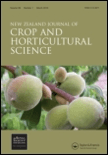
NEW ZEALAND JOURNAL OF CROP AND HORTICULTURAL SCIENCE
Pioneering Research for Tomorrow's Agricultural ChallengesThe New Zealand Journal of Crop and Horticultural Science, published by Taylor & Francis Ltd, stands as a key resource in the fields of Agronomy and Horticulture, with a commendable impact factor reflecting its quality and influence in the scientific community. Since its inception in 1989, this journal has been committed to advancing our understanding of crop development and horticultural practices, catering not only to researchers and professionals but also to students eager to delve into the intricacies of plant sciences. With a Q3 ranking in both Agronomy and Crop Science and Horticulture as of 2023, the journal occupies a significant position within the agricultural and biological sciences domain, significantly contributing to the body of knowledge in these fields. The journal features original research, reviews, and technical notes that cover a wide range of topics, ensuring a comprehensive perspective on contemporary and emerging agricultural issues. For individuals interested in accessing cutting-edge research, the journal provides subscription-based access, further enhancing its scholarly contributions.
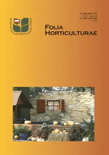
Folia Horticulturae
Exploring the Depths of Horticultural Research.Folia Horticulturae, an esteemed journal in the field of Horticulture, serves as a pivotal platform for the dissemination of innovative research and developments within agricultural and biological sciences. Published by SCIENDO, this open-access journal has been contributing to the global scientific community since 2004, ensuring that key findings are freely accessible to researchers, professionals, and students alike. Based in Poland, the journal boasts an impressive Q2 ranking in Horticulture, indicating its solid impact and significance in the field, with a Scopus rank of #32 out of 115, placing it in the 72nd percentile. With a commitment to fostering scientific discourse, Folia Horticulturae actively encourages contributions that explore various aspects of horticultural science, from crop management to sustainability practices. This initiative not only enhances knowledge but also advances practical applications, making it an invaluable resource for anyone interested in the intricacies of horticulture.
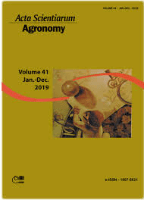
ACTA SCIENTIARUM-AGRONOMY
Connecting researchers to the pulse of agricultural innovation.ACTA SCIENTIARUM-AGRONOMY is a prestigious, peer-reviewed journal published by UNIV ESTADUAL MARINGA, PRO-REITORIA PESQUISA POS-GRADUACAO, focusing on advanced research in the field of agronomy and crop science. Since its inception as an Open Access journal in 2007, it has significantly contributed to disseminating high-quality research, allowing unrestricted access to its content for a global audience. Operating from Brazil, the journal holds a notable Q2 category ranking in Agronomy and Crop Science as of 2023, validating its importance within the academic community. The journal’s Scopus ranking positions it in the 49th percentile among Agricultural and Biological Sciences, indicating a robust foundation for impactful research. With a commitment to innovation and scientific excellence, ACTA SCIENTIARUM-AGRONOMY aims to provide researchers, professionals, and students with vital insights that drive forward our understanding of agriculture and its environmental implications.
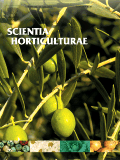
SCIENTIA HORTICULTURAE
Unveiling the science behind sustainable plant production.SCIENTIA HORTICULTURAE, published by Elsevier, is a leading journal in the field of horticulture, with an impressive impact factor reflected in its Q1 ranking (2023) and position as #6 out of 115 in the Scopus category for Agricultural and Biological Sciences. This journal plays a pivotal role in disseminating cutting-edge research and innovations in horticultural science and technology, contributing significantly to the understanding of plant cultivation, production, and management. With continuous publication since 1973, SCIENTIA HORTICULTURAE offers an essential platform for researchers, professionals, and students alike who are focused on the advancement of sustainable horticultural practices. Although it is not an open-access journal, it provides a wealth of data and findings that can be accessed through institutions and libraries. Located in the Netherlands at RADARWEG 29, 1043 NX AMSTERDAM, this journal remains an invaluable asset to the global horticultural community throughout its converged years, fostering collaboration and elevating standards in horticulture research.
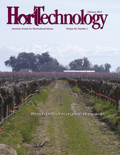
HORTTECHNOLOGY
Cultivating excellence in horticultural research and education.HORTTECHNOLOGY is a premier open-access journal published by the American Society for Horticultural Science, focusing on innovative research and advancements in the field of horticulture. With an ISSN of 1063-0198 and an E-ISSN of 1943-7714, this esteemed journal has been disseminating valuable information since 1993 and continues to be a key resource with a convergence period extending to 2024. HORTTECHNOLOGY holds a reputable position in the academic community, classified in the Q2 quartile for horticulture, reflecting its significance and quality within the discipline. Its current Scopus rank places it at 49 out of 115 within Agricultural and Biological Sciences - Horticulture, positioning it in the 57th percentile. Researchers, professionals, and students alike benefit from the accessible research findings this journal offers, addressing critical challenges and advancing knowledge in horticultural practices. HORTTECHNOLOGY is committed to fostering scientific progress and open dialogue within the horticultural community, making it an invaluable resource for anyone passionate about the field.

Pesquisa Agropecuaria Tropical
Unlocking insights for global agricultural progress.pesquisa Agropecuaria Tropical is a premier Open Access journal dedicated to advancing the knowledge and practices within the field of agronomy and crop science. Since its inception in 1971, this peer-reviewed journal, published by the Universidade Federal de Goiás, has played a pivotal role in disseminating high-quality research from Brazil and beyond. Operating under an Open Access model, it ensures that scholarly articles are freely accessible, thereby fostering greater collaboration and innovation. With a Scopus ranking placing it in the 32nd percentile among its peers in agricultural and biological sciences, and a current classification in the Q3 category of agronomy and crop science, the journal serves as an essential resource for researchers, professionals, and students alike. As it continues its publication journey from 2010 to 2024, it remains committed to contributing valuable insights and advancements in the agricultural sector, ultimately influencing sustainable practices and food security.

JOURNAL OF HORTICULTURAL SCIENCE & BIOTECHNOLOGY
Bridging the gap between horticulture and biotechnology for a greener tomorrow.JOURNAL OF HORTICULTURAL SCIENCE & BIOTECHNOLOGY, published by Taylor & Francis Ltd, stands as a prestigious platform in the realms of both horticulture and biotechnology. With an ISSN of 1462-0316 and an E-ISSN of 2380-4084, this journal showcases cutting-edge research that advances our understanding of plant science and genetic innovation. Operating under the publication umbrella from 1996 to 2024, the journal has achieved notable rankings, placing in the Q3 quartile for Genetics and Q2 for Horticulture in 2023. With a Scopus ranking of #25/115 in Agricultural and Biological Sciences (Horticulture) and a respectable 78th percentile, it is highly regarded among researchers and professionals alike. While currently not designated as Open Access, the journal remains crucial for academics keen on disseminating groundbreaking findings and techniques that foster advancements in agricultural productivity and sustainability. As an essential resource for researchers, professionals, and students, JOURNAL OF HORTICULTURAL SCIENCE & BIOTECHNOLOGY not only facilitates knowledge sharing within its community but also serves as a vital reference point for future innovations in the field.

Journal of Berry Research
Advancing Knowledge in Berry Health and InnovationJournal of Berry Research, published by IOS PRESS, is an essential scholarly platform that addresses a wide array of topics related to the health benefits, cultivation, and innovation surrounding berry species. With an ISSN of 1878-5093 and an E-ISSN of 1878-5123, this journal has successfully carved a niche in various interdisciplinary fields, achieving notable rankings in its respective categories, including Q2 in Agronomy and Crop Science and Q3 in Biochemistry and Food Science as of 2023. The journal not only serves as a repository of rigorous research but also facilitates the exchange of knowledge among researchers, professionals, and students invested in agronomy, horticulture, and plant science. The HIndex reflects its growing impact within these disciplines. Set against the backdrop of the Netherlands since its inception in 2010, the Journal of Berry Research continues to provide cutting-edge insights, making it a pivotal resource for those pursuing advances in berry research and its associated fields.
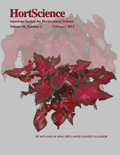
HORTSCIENCE
Pioneering discoveries in the world of horticulture.HORTSCIENCE is a prestigious journal published by the American Society for Horticultural Science, focusing on the latest research and developments in the field of horticulture. With an ISSN of 0018-5345 and an E-ISSN of 2327-9834, this journal has established itself as a vital resource for horticultural scientists, practitioners, and educators since its inception. As of 2020, it has embraced an Open Access model, promoting the dissemination of scientific knowledge and enabling wider accessibility to its rich content. HORTSCIENCE currently holds a Q2 ranking in the Horticulture category for 2023, placing it in the top tier of its field with a Scopus rank of 36 out of 115 in the area of Agricultural and Biological Sciences. This journal publishes empirical research, significant advancements, and comprehensive reviews that contribute to the understanding and improvement of horticultural practices, making it an essential publication for anyone involved in horticultural research or education.

EUROPEAN JOURNAL OF HORTICULTURAL SCIENCE
Fostering dialogue on contemporary horticultural advancements.The European Journal of Horticultural Science, an esteemed publication of the International Society for Horticultural Science (ISHS), serves as a pivotal platform for advancing the field of horticulture since its inception in 2003. With its base in Germany, this journal occupies a significant position in the Q3 quartile of horticultural research, confidently ranked #60 out of 115 in the Agricultural and Biological Sciences category on Scopus, reflecting its relevance and impact within the scholarly community. The European Journal of Horticultural Science fosters open access to a wealth of research and insights, facilitating knowledge sharing among researchers, professionals, and students dedicated to the innovative and sustainable practices in horticultural science. As it embarks on a new chapter through its convergence years leading up to 2024, the journal aims to enhance the dialogue on contemporary horticultural challenges and advancements, making it an essential resource for those seeking to contribute to and learn from ongoing developments in this vital field.